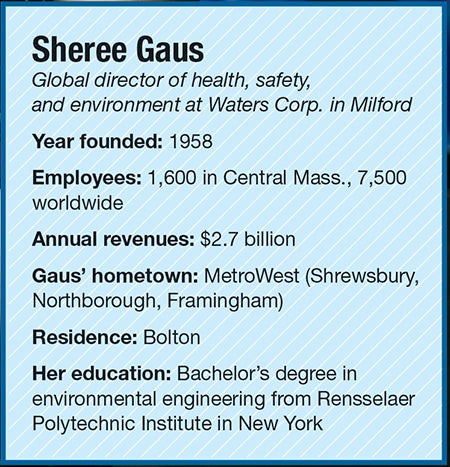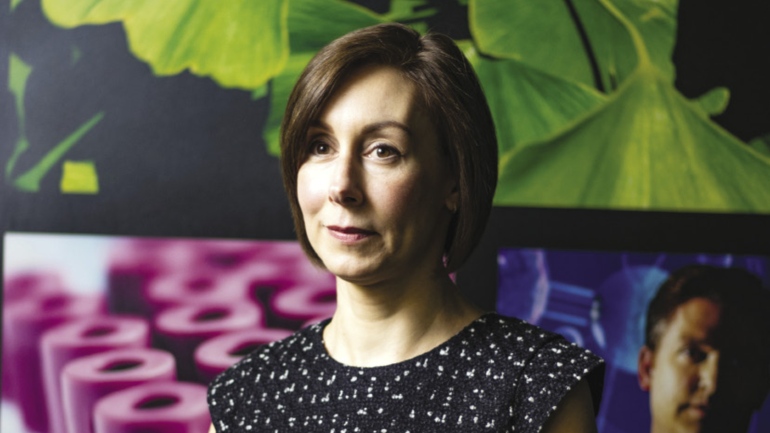On April 1, Sheree Gaus began her first term on the board of Women in Manufacturing Association, a nonprofit trade group founded in Ohio with aspirations of making a global impact.
Get Instant Access to This Article
Subscribe to Worcester Business Journal and get immediate access to all of our subscriber-only content and much more.
- Critical Central Massachusetts business news updated daily.
- Immediate access to all subscriber-only content on our website.
- Bi-weekly print or digital editions of our award-winning publication.
- Special bonus issues like the WBJ Book of Lists.
- Exclusive ticket prize draws for our in-person events.
Click here to purchase a paywall bypass link for this article.
On April 1, Sheree Gaus began her first term on the board of Women in Manufacturing Association, a nonprofit trade group founded in Ohio with aspirations of making a global impact. Gaus, who heads global safety for Milford manufacturer Waters Corp., has spent nearly 15 years in the manufacturing industry and has often been the only woman in the room.

What do you do for Waters?
I focus on protecting our people and the environment from the hazards we create. We make laboratory analysis instrumentations, for things like food safety. We do quite a bit of chemical handling, which requires its own level of regulations. Waters operates 86 sites in 35 different counties, and all the regulations vary by the different countries.
Since the pandemic started, I have handled COVID protocols for Waters. Even in the early days of the pandemic, we stayed open as an essential business, so we had to develop intensive COVID safety protocols.
What are the best countries for safety?
The European Union has rigorous regulations, as well as the U.S. We try to set corporate standards on a global basis. There is some variation based on the locality, but we want to have the same level of safety regardless of what country a facility is in.
Why did you want to join the Women in Manufacturing board?
The organization is relatively new, as started in 2012 in Ohio. Waters is a corporate member, so I had been introduced to its programs for several years. The association has doubled its membership since the pandemic, since it offers a lot of education and training resources.
When Women in Manufacturing put out calls for new members of the board, I thought I could add a lot of perspective to the organization’s leadership, particularly as it is looking to expand more globally. My application was accepted, and I just had my first meeting.
What does the association want to accomplish?
At its most basic, the association wants to attract women to the manufacturing industry. The first way we are doing that is to dispel the notion of what manufacturing is. We have a lot of old pictures in our head of what the industry used to be, but what manufacturing is today isn’t what it was in the old days. Here in Central Mass., we have a lot of high-tech, clean manufacturing. We need women to see the industry as an option. Only one in four manufacturing leaders is a woman.
The second way is empowering women so they can connect with others, so they know they are not alone. As a woman in manufacturing in health and safety, I know how isolating it can feel; there are a lot of times when I am the only woman in the room.
Third is providing a foundation to support women in developing their careers: women in production; emerging managers; targeted training for executives.
I've been working with Waters’ diversity, equity, and inclusion director to shore up a more official partnership with Women in Manufacturing, so the company is sponsoring and sending women to these trainings.
What do you hope to accomplish as a board member?
I’m looking to continue the expansion of this group. I am joining the international committee. The organization started off in Ohio and was really a Midwest thing initially. Now it is a national organization, and the pandemic led to international exposure. We are looking to have an event in Europe, maybe by the end of the year.
It is great to be around all these great women leaders. There is a lot of great collaboration. We are developing a framework and standards for the local chapters: what your state chapter should look like; what your organization should have; what your goals should be.
One of the other things that drew me to being on the board is the importance of diversity and inclusion at Waters, which is also one of the things that drew me to Waters. Rather than just talking about it, we have put efforts around diversity & inclusion, putting hiring practices in place to ensure more diversity hiring. We fund training programs for young people.
There is so much research that people from different backgrounds bring all sorts of better perspectives. More perspectives lead to better problem-solving, which leads to a better company.
This interview was conducted and edited for length and clarity by WBJ Editor Brad Kane.

